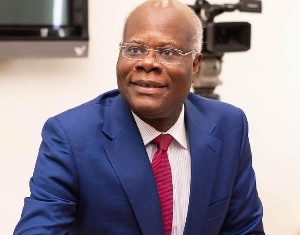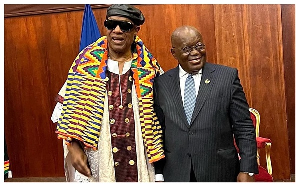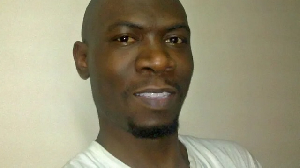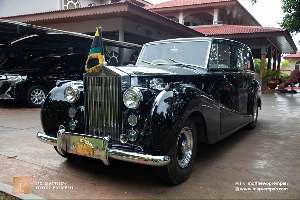- Home - News
- TWI News | TV
- Polls
- Year In Review
- News Archive
- Crime & Punishment
- Politics
- Regional
- Editorial
- Health
- Ghanaians Abroad
- Tabloid
- Africa
- Religion
- Election 2020
- Coronavirus
- News Videos | TV
- Photo Archives
- News Headlines
- Press Release
General News of Monday, 23 May 2011
Source: The Herald
How Judge Duped Businessman of ¢3 Billion
The decision by the Judges and Magistrates Association to blacklist some four vociferous lawyers, Dr. Raymond Atuguba, Larry Bimi, David Annan and Dr. Abraham Amaliba until they substantiate their assertions that there is massive corruption within the Judicial Service is opening up a can of worms.
Sometime in 2009, a Cape Coast Circuit Court Judge, Mr. Richard Asiedu-Badu, together with eight other accomplices, was arraigned before an Accra High Court (Commercial Division) on charges of conspiracy and fraud. The decision of the court, presided over by Justice Barbara Ackah Ayensu, has been described by some followers of the case as “Unbelievable”.
Mr. Asiedu-Badu, had turned his office and state bungalow into venue for a false transacting gold business, and with his accomplices, they forged the signature of an Accra- based businessman, Alhaji Taufig Mohammed Gariba, and also used court facilities to dupe the businessman of a total of three billion, Ninety Six million, One hundred and Eighty Nine Thousand Four Hundred cedis,
When The Ghanaian Chronicle, an Accra daily, reported the scandal, the Judicial Secretary, Justice Alex Acheampong quickly and publicly announced on Joy FM that Mr. Asiedu-Badu had been suspended pending a judicial probe into the case, but days later, he was in his courtroom busily trying and jailing fraudsters and people who had been accused of stealing fowls and plantain. The report of the so-called investigation into the judge’s conduct never came to light.
Justice Ayensu ruled in December last year, that Circuit Court Judge Richard Asiedu-Badu and his accomplices were not guilty of the offences charged against them, and that the complainant, an Accra- based businessman, should go and look for the people who duped him of the billions of cedis.
The reaction of the complainant to the court’s ruling was obvious. He said, given the manner the case was handled, he has lost confidence in the judiciary of the country, pointing out that throughout the trial, the accused Circuit Court Judge did not appear before the court, to even testify.
Alhaji Gariba has told The Herald that Justice Asiedu-Badu, prior to the commencement of the trial, bragged to him that the case would never get anywhere, and his words came to pass.
He recalled how anytime court bailiffs were to serve documents on the accused, it was their accomplice judge who collected them to do the service, arguing that if the judiciary were transparent, this would not have happened.
Now, Alhaji Gariba says that because of the injustice in the judicial system, he is now saddled with a huge debt, and has to sell his property to defray the debt. Mr. E.A. Vordoagu, was his lawyer.
Some Chronicle staff have told The Herald that soon after The Ghanaian Chronicle’s publication of the story involving the judge, Justice Asiedu-Badu stormed The Ghanaian Chronicle Newspaper’s office at Tesano- Accra, with some hooligans, threatening to cause mayhem.
Below is the story of Alhaji Gariba, on the judge’s alleged criminal involvement in the gold business. “I trusted him because he is a judge, and judges, I know, are supposed to stand for justice, but this one is a fraudster. He took advantage of my illiteracy, and has duped me billions of cedis.”
This statement was uttered in the Ga language to Mr. Larry Dogbey, then with The Enquirer.
Alhaji Gariba, had been defrauded in a grand scheme spearheaded by a Circuit Court Judge in Cape Coast in the Central Region, Justice Richard Asiedu-Badu, with friends of his, who are illegal miners (Galamsey operators) based in Kumasi, Konongo, Nkawkaw and Tarkwa.
A total of three billion, Ninety Six million, One hundred and Eighty Nine Thousand Four hundred cedis, was lost to the “Galamsey” operators by the businessman, based on the judge’s false claims, and who, among other things, used court facilities at his disposal, including stamps, his office and official bungalow, to give a semblance of legality to fake documents he had designed.
Justice Asiedu-Badu took advantage of the businessman’s inability to read and write the Queen’s language, and prepared fake partnership agreements to convince the businessman to dole out the huge sums of money to the supposed miners to supply him with gold, but which did not happen.
The businessman could only read and write Arabic, yet the agreement designed and witnessed by the same judge, falsely claimed that he reads and writes English, hence understood what he was made to sign.
When it became clear that the so-called miners had duped the businessman, Justice Asiedu- Badu stormed the CID Headquarters in Accra, after the police arrested the fraudsters in 2008, boasting of his judicial powers and political connections, and bullied the police to set free his partners-in-crime.
When this reporter reached him sometime in August 2009, on phone, he confirmed the court case, but insisted that he only introduced the businessman to the miners, some of whom were his classmates.
He also admitted storming the CID Headquarters to free the suspects, and explained that the case was purely a civil matter, and that the police should not have arrested the fraudsters.
Alhaji Gariba prayed the court to cite Justice Asiedu-Badu and his eight accomplices for fraud, and order them to refund his money with interest at prevailing commercial bank lending rate.
The fact of the case is that sometime in July 2008, Shehu Ahmed, the second accused person, who used to work with Alhaji Gariba, told him that he knew one Kayode Iddrisu, the third accused person, and that he could assist them in their gold business, and upon that a trip to Kumasi was planned to meet with Mr. Iddrisu.
In Kumasi, Mr. Iddrisu also introduced them to one Paul Oye, the fourth accused person, who said he could arrange a meeting with somebody who knew genuine gold suppliers by virtue of his position as a judge.
Justice Asiedu-Badu, the first accused, was met in Cape Coast at a meeting arranged by Oye, where the businessman was introduced to him (judge) as a gold dealer and financier looking for genuine gold suppliers to do business with.
In the presence of Mr. Iddrisu and Mr. Ahmed, the Circuit Court judge admitted that he knows genuine gold dealers, and introduced Mohammed Suleman Imman and Samuel Dwumah, the seventh and eighth accused persons respectively, as the gold dealers.
He further went ahead to design a partnership agreement between the businessman as a financier and his (judge’s) pals as gold suppliers.
As per the agreement designed and also witnessed by Justice Asiedu-Badu, Imman and Dwumah, the so called suppliers, would be advanced monies to enable them to mine and supply the gold to Alhaji Gariba.
However, the said partnership agreement, according to Mr. E.A. Vordoagu, counsel for Alhaji Garuba, “was misleading, totally false and beneficial only to ‘Galamsey’ operators in the event of a breach or dispute.”
Interestingly, the document also turned out to be a supply contract, not a partnership agreement as it was titled, said the lawyer in the writ of summons.
A house claimed to be located at Dome in Accra, belonging to one of the “Galamsey” operators, Imman, and used as collateral against the monies advanced him and his colleague, was not valued to ascertain its true market value, or forced value yet the judge took advantage of the businessman’s illiteracy and convinced him to accept the terms of the agreement.
Again, though a law expert, Justice Asiedu-Badu also allowed one of the accused persons, Ahmed, to sign the agreement twice as financier/partner, as well as a witness to the agreement, using two different signatures in the same contract document.
Based on the contract and assurances from the judge that his friends were genuine gold dealers, huge sums of money were given out to the “Galamsey” operators to supply gold, but they failed, and ran into debt of GH¢ 119,620.94.
Justice Asiedu-Badu again introduced two other friends of his, Paul Karikari and Isaac Kwame Osei, fifth and sixth accused persons respectively, through Ahmed, as gold dealers, and asked that they should be given a total of GH¢300, 000, 00 to supply the mineral.
That too was done with another phony agreement designed by him (judge) and signed in the absence of the businessman who was outside Ghana then.
Here again, a house and a plot offered at Konongo and Suntreso, suburbs of Kumasi, respectively, were used as collateral by Karikari against the monies, but the gold supplied was less than the value of the sum advanced to them. Out of the GH¢300, 000, 00 they supplied gold worth GH¢190, 000, 00 only.
Later, the judge went to the businessman’s residence at Kasoa in the Central Region to plead on behalf of his friends that they had incurred a loss of GH¢110, 000, 00 during procurement. However, attempts by the businessman to sell the collaterals at Konongo and Suntreso to defray the debt were vehemently opposed by the judge.
Justice Asiedu-Badu further begged the businessman to give additional GH¢150, 000, 00 because his friends have three gold concessions at Akyensa in the Eastern Region, which he (judge) had confirmed and even got documents on from the Minerals Commission, and this could be used as security for the money.
However, after collecting the additional monies, the “Galamsey” operators went into hiding, and even calls to their mobile phones went dead, and various promises by the judge to get them to refund all the monies also proved futile.
The businessman, subsequently, got them arrested and sent to the CID Headquarters in Accra; however, the judge stormed the CID office and threatened the officer in-charge of the case, Mr. Mawusi, to set the suspects free or be dealt with, and they were released.
Ebenezer Bosomtwe, the ninth accused person, was also introduced by Justice Asiedu-Badu, and he too got GH¢28,926, 00, to supply gold but he failed to deliver it.










